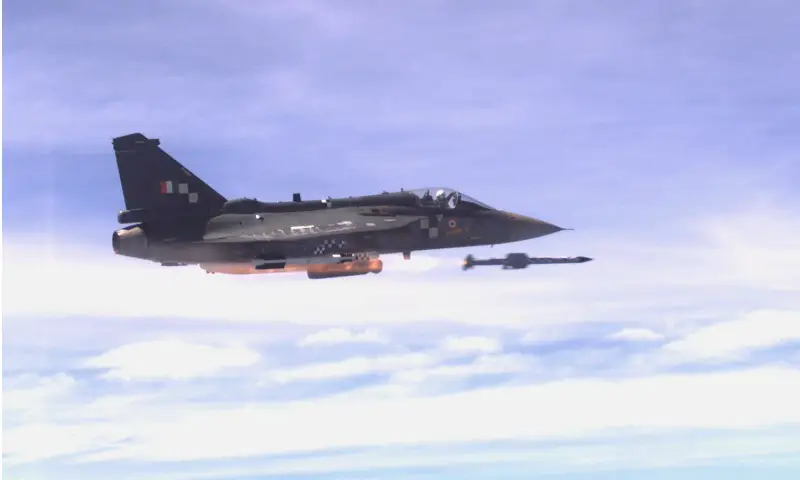The HAL Tejas Light Combat Aircraft (LCA) LSP-7 successfully fired the ASTRA indigenous Beyond Visual Range (BVR) air-to-air missile (AAM) off the coast of Goa on August 23, 2023. The missile release was successfully carried out from the aircraft at an altitude of about 20,000 ft. All the objectives of the test were met and it was a perfect text-book launch. The test launch was monitored by the Test Director and scientists of Aeronautical Development Agency (ADA), Defence Research and Development Organisation (DRDO), Hindustan Aeronautics Limited (HAL) along with officials from Centre for Military Airworthiness and Certification (CEMILAC) and Directorate General of Aeronautical Quality Assurance (DG-AQA). The aircraft was also monitored by a Tejas twin seater chase aircraft.
ASTRA, a state-of-the-art BVR air-to-air missile to engage and destroy highly maneuvering supersonic aerial targets, is designed and developed by Defence Research and Development Laboratory (DRDL), Research Centre Imarat (RCI) and other laboratories of DRDO. The indigenous Astra BVR firing from home grown Tejas fighter is a major step towards ‘Aatmanirbhar Bharat’. Raksha Mantri Shri Rajnath Singh has complimented ADA, DRDO, CEMILAC, DG-AQA and the industry for the successful firing of the missile from Tejas-LCA. He said the launch would significantly enhance the combat prowess of Tejas and reduce the dependency on imported weapons. Secretary, Department of Defence (R&D) and Chairman DRDO has also congratulated the teams involved in the successful launch.
The HAL Tejas (Sanskrit: “Radiance”) is an Indian single engine, delta wing, light multirole fighter designed by the Aeronautical Development Agency (ADA) in collaboration with Aircraft Research and Design Centre (ARDC) of Hindustan Aeronautics Limited (HAL) for the Indian Air Force and Indian Navy. It was developed from the Light Combat Aircraft (LCA) programme, which began in the 1980s to replace India’s ageing MiG-21 fighters but later became part of a general fleet modernisation programme. In 2003, the LCA was officially named “Tejas. It is the smallest and lightest in its class of contemporary supersonic combat aircraft. The Tejas is the second fighter developed by HAL with the intention of attaining supersonic performance, after the HAL HF-24 Marut.
Astra (Sanskrit: “throwing weapon”) is an Indian family of all weather beyond-visual-range air-to-air missile, developed by the Defence Research and Development Organisation. Different missiles of this family are capable of engaging targets at varying distances of 500 m (0.31 mi) up to 340 km (210 mi). Astra Mk-1 has been integrated with Indian Air Force’s Sukhoi Su-30MKI and will be integrated with Dassault Mirage 2000, HAL Tejas and Mikoyan MiG-29 in the future. Limited series production of Astra Mk-1 missiles began in 2017. After the deployment of Astra Mk-1, several offshoot versions are being planned including an imaging Infra-red homing missile tentatively classified as Astra-IR, a longer range Astra Mk-2 version and a further development called Astra Mk-3.
#DRDOUpdates | Achieving major milestone towards #atmanirbharbharat ASTRA-Beyond Visual Range (BVR) Missile in its maiden flight trial was successfully fired from LCA Tejas off the coast of Goa.@DefenceMinIndia@SpokespersonMoD https://t.co/UF4p5GVfeI pic.twitter.com/dqoIWY0LTf
— DRDO (@DRDO_India) August 23, 2023















